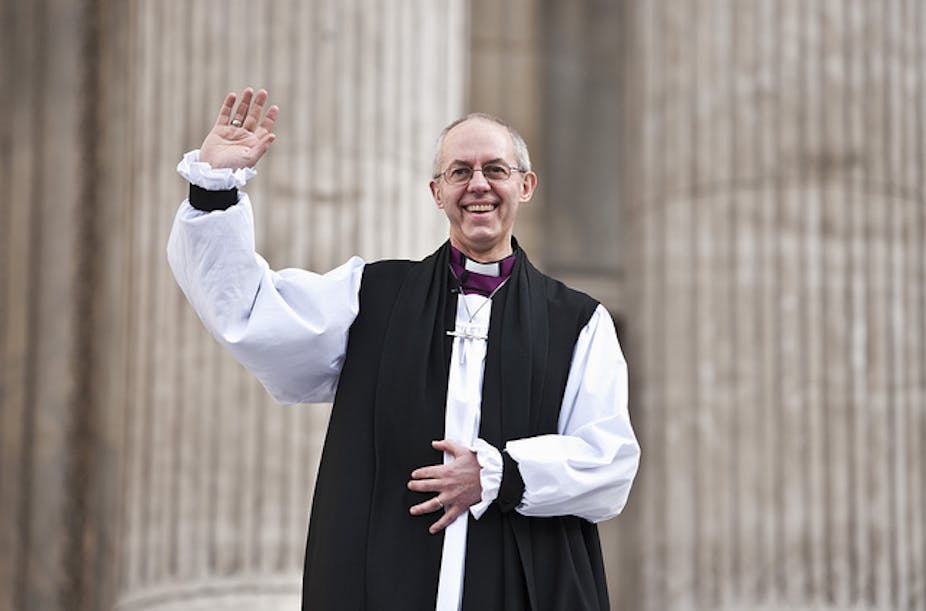The Archbishop of Canterbury, Justin Welby, has become increasingly involved in debates about the UK financial sector. The embarrassing revelations that the Church has invested indirectly in payday lender Wonga are unlikely to stop his campaign against costly forms of consumer finance.
The archbishop was a vocal member of the recent Parliamentary Commission on Standards on Banking, pushing for a consideration of the bottom end of the banking market. This meant the commission’s report, released last month, did not just focus on making the big banks safer; there was also a call to ensure the poor have access to finance at rates similar to the middle classes.
The recommendations for reforming the bottom end of the financial market have been largely overlooked in the wake of the report. But the archbishop has launched his own mission to take on the financial bottom-feeders, becoming an outspoken critic of payday lending. And he has very good reason to take aim at elements of this part of the industry, as it offers short-term loans to often poor consumers. It uses complex consumer surveillance techniques to offer loans quickly, at huge levels of interest (5000%+ APR ). As the recession has pushed many people to the financial brink, they have turned to loans from such lenders and the result has been a rapid growth in the industry - from £900m in 2008/9 to £2.2 billion in 2011/2.
This might sounds like a nice growth story in these dark economic times. But there is increasing evidence it has come with significant social costs. A recent survey by the Citizens Advice Bureau found evidence of some lenders offering loans to underage people, inadequate checks on borrowers, taking more than is owed, harassing borrowers, draining bank accounts and refusing to agree repayment plans. In addition, a charity advising indebted people has found there was a 300% rise in people approaching them with problems with payday loans.
More than a malcontent
But the archbishop is more than just an ecclesiastical malcontent. After all, he has a background as an oil executive. In a recent wide-ranging interview, the archbishop announced he hoped to compete payday lenders out of existence.
This does not mean the church setting up its own bank, but it does mean it will help to support credit co-ops. They will provide these community organisations with access to church spaces across the country, the expertise lurking among parishioners, and a big potential pool of customers sitting in the pews. The hope is this support will help to build the strength of these co-ops that provide finance to poorer borrowers at far lower interest rates (a maximum rate of 42.6% APR).

Taking on payday lenders addresses an important tension in the government’s new banking policies. The Banking Standards report contained an important paradox. It pointed out banks need to become safer. This means holding more capital and having larger risk functions, something that can only be done by large banks.
The cost is often lending to more risky clients, such as individuals and small businesses, who are often pushed into the arms of payday lenders. Welby’s proposal to support credit co-ops will help to create more credible alternatives to these lenders.
There is no doubt that alternatives are strangely lacking in the industry. The past decade has seen the increasing consolidation of a few large banks which the public appears to mistrust. At the same time there have been significant advances in technology which allow us to use money in different ways. Taken together, these trends have created very fertile ground for innovative business models.
But what is surprising is that so few people have taken up the challenge. And many these innovations have come from the margins – a retailer who started Metrobank, the faceless hackers who lauched Bitcoin, the social activists experimenting with crowdsourced funding, and of our the technology entrepreneurs involved in online payday lending. With the appearance of these alternatives, some claim that banking is about to face an “iTunes moment”. This will involve companies adapting digital business models to do the same thing a large established business was already doing – but more conveniently and at a fraction of the cost. Just like the entry of Apple into the recording industry, digital challengers are likely to change the way banking works.
But what remains to be seen is how these would-be digital challengers might offer a product that is hip and cheap but also ethical and safe. Perhaps this is where the church’s support of credit co-ops comes in. It could harness its community reach, coupled with its own expertise, to support real credible alternatives.
Wading in
Yet wading into the world of finance does not come without its risks. The revelation that the Church of England’s pension fund had invested in a North American venture capital firm that in turn invested in Wonga has certainly done some damage. The amount involved is small – £75,000 compared with an overall fund of £5.2 billion. But the damage this might cause to the archbishop’s campaign as well as the church’s reputation could be larger.
Indeed, this has already highlighted some important gaps in the church’s ethical investment policy. Probably the most surprising was that under this policy, the church’s fund can invest in a company which holds up to 25% investment in industries such as porn, gambling, payday lending, and 10% in weapons. The Wonga news will spur a change in the policy, but it could mean the church loses some of the moral authority which its leader is currently trading on in his mission to reform the industry.
The second big risk comes from bounded rationality. The church is certainly full of smart people, some of whom have significant financial acumen. But contemporary financial markets are exceedingly complex, and recent research suggests it is almost impossible to identify who owns which shares in the UK economy. This means despite how much the good bankers of the church try to locate all “sinful” investments on their balance sheet, it will be almost impossible. The result is that a diligent sin-stock seeker will always be able to find something untoward among the church’s investments. Getting more involved in the financial markets is likely to bring these complexities into greater public focus.
The final significant risk the church faces is mission creep. If it gets occupied with matters financial, it could find that its precious attention gets taken away from its core role. And one thing we do know is that when organisations begin to focus on non-core activities, then they can start on a slippery slope towards failure. One way to mitigate this danger is to ensure that any forays into financial issues remain clearly connected to the purpose of the church and what it is actually good at doing.
There is an important social justice dimension to the struggle to reform the consumer finance market. This is the exact sort of issue where the church can make, and traditionally has made, a positive impact. If the archbishop can maintain moral authority while sticking closely to the campaign’s goals, then this fight is there to be won. An embarrassing investment should not put him off.

